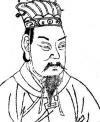Cao Cao poet from China was born in 155, had 65 years and died on March 15, 220. Poems were written in Ancient mainly in Chinese language. Dominant movement is chinese dynasties.
Biography
Cao Cao style name Mengde, was a warlord and the penultimate Chancellor of the Eastern Han Dynasty who rose to great power in the final years of the dynasty. As one of the central figures of the Three Kingdoms period, he laid the foundations for what was to become the state of Cao Wei and was posthumously honoured as "Emperor Wu of Wei". Although he is often portrayed as a cruel and merciless tyrant, Cao Cao has also been praised as a brilliant ruler and military genius who treated his subordinates like his family. He was also skilled in poetry and martial arts and wrote many war journals.
Cao Cao was born in Qiao (present-day Bozhou, Anhui) in 155. His father Cao Song was a foster son of Cao Teng, who in turn was one of the favourite eunuchs of Emperor Huan. Some historical records, including the Biography of Cao Man, claim that Cao Song's original family name was Xiahou.
Cao was known for his craftiness as an adolescent. According to the Biography of Cao Man, Cao Cao's uncle complained to Cao Song about Cao Cao's indulgence in hunting and music with Yuan Shao. In retaliation, Cao Cao feigned a fit before his uncle, who immediately rushed to inform Cao Song. When Cao Song went to see his son, Cao Cao behaved normally. When asked, Cao Cao replied, "I have never had a fit, but I lost the love of my uncle, and therefore he deceived you." Afterwards, Cao Song ceased to believe his brother regarding Cao Cao, and thus Cao Cao became even more blatant and insistent in his wayward pursuits.
At that time, there was a man named Xu Shao who lived in Runan and was famous for his ability to evaluate a person's potentials and talents. Cao Cao paid him a visit in hopes of receiving an evaluation that would help him politically. At first, Xu Shao refused to make a statement; however, under persistent questioning, he finally said, "You would be a capable minister in peaceful times and an unscrupulous hero in chaotic times." Cao Cao laughed and left. There are two other versions of this comment in other unofficial historical records[which?]: "capable minister in peaceful times, unrighteous hero in chaotic times" and "sinister foe in peaceful times, great hero in chaotic times."[citation needed]
At the age of 20, Cao Cao was appointed district captain of Luoyang. Upon taking up the post, he placed rows of multicolored stakes outside his office and ordered his deputies to flog those who violated the law, regardless of their status. An uncle of Jian Shuo, one of the most powerful and influential eunuchs under Emperor Ling, was caught walking in the city after the evening curfew by Cao Cao's men and was flogged. This prompted Jian Shuo and other higher authorities to ostensibly promote Cao Cao to the post of governor of Dunqiu County while actually moving him out of the imperial capital. Cao Cao remained in this position for little more than a year, being dismissed from office in 178 for his distant family ties with the disgraced Empress Song. Around 180, Cao Cao returned to court as a Consultant (議郎) and presented two memoranda against the eunuchs' influence in court and government corruption during his tenure, to limited effect.
When the Yellow Turban Rebellion broke out in 184, Cao Cao was recalled to Luoyang and appointed Captain of the Cavalry (騎都尉) and sent to Yingchuan in Yu Province to suppress the rebels. He was successful and was sent to Ji'nan (濟南) as Chancellor (相) to prevent the spread of Yellow Turban influence there. In Ji'nan, Cao Cao aggressively enforced the ban on unorthodox cults, destroyed shrines, and supported state Confucianism. He offended the local leading families in the process, and resigned on grounds of poor health around 187, fearing that he had put his family in danger. He was offered the post of Administrator of Dong Commandery (東郡), but he declined and returned to his home in Pei County. Around that time, Wang Fen (王芬) tried to recruit Cao Cao to join his coup to replace Emperor Ling with the Marquis of Hefei, but Cao Cao refused. The plot came to nothing, and Wang Fen killed himself.






